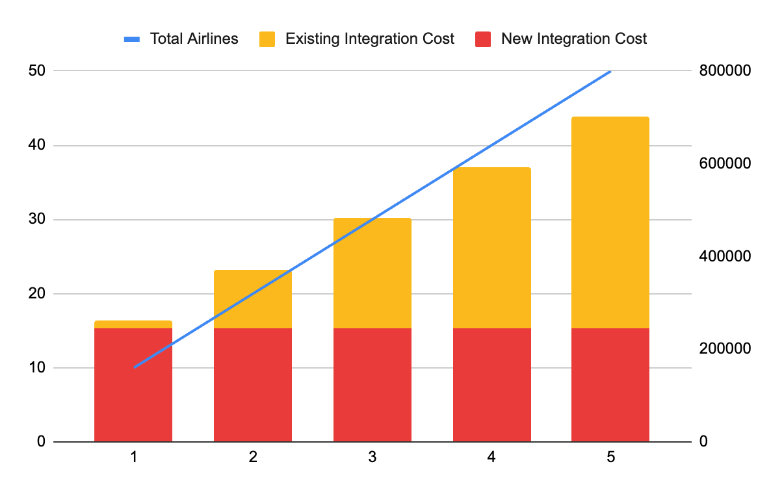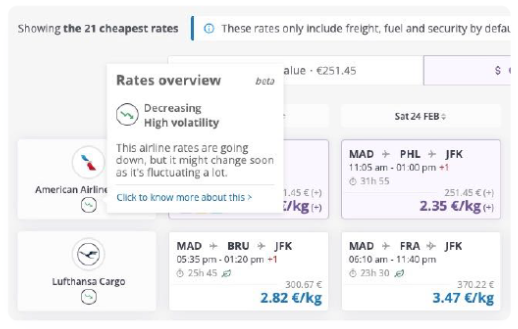The Benefits of Platform vs Point-to-Point Integrations for Freight Forwarder Efficiency | WebCargo

The Strategic Edge of Platform Over Point-to-Point Integrations For Freight Forwarder Efficiency
Imagine if every car driver constructed their own road to get from point A to point B. While the idea of a personalized, in-house road with full control over its design may be enticing, it comes with a hefty price tag.
As the landscape fills with a mishmash of personal highways, efficiency plummets. Without standardized construction methods, traffic congestion ensues, leading to bottlenecks and dead ends. Infrastructure struggles to keep pace, resulting in a chaotic network of roads without coherence. The cost of ongoing maintenance and the challenge of streamlining traffic flow becomes increasingly prohibitive.
There’s a better way.
Might it not be better to eliminate the need for individuals to bear the heavy cost of initial development, while drastically reducing ongoing maintenance costs?
If you use roads built and maintained by experts in field – ie. civil engineers, this is what you’ve already been doing. Now move that model to air cargo.
There’s a growing number of freight forwarders ready to integrate with airlines for pricing and booking. But if each builds their own “road” for integration, it can end up costing the industry – and forwarders’ customers – time and resources. This is precisely what use of a third-party air cargo booking platform like WebCargo does in the era of digital transformation in air cargo. In fact, air cargo is merely catching up to countless other industries that have already largely left behind their in-house tech stacks, (such as outdated freight rate management systems and TMS platforms), in favor of vastly improved external connections with carriers and shippers.
Read on to discover:
- How platform integrations surpass point-to-point solutions financially
- The other key strategic benefits of platform integrations, including enhanced carrier access, operational efficiency, TMS integrations and beyond
- Why platform integrations increase security and reduce vulnerability exposure
Air Cargo Digital Transformation With Exponential Freight Forwarder Efficiency
With more connections to more carriers (carriers representing some 65% of global air cargo capacity have already gone online) and buyers, the right integrations can unlock exponential growth for freight forwarders.
Given the heavy lift required for airline connectivity, the frequent changes or issues, and commercial or technical limitations from carrier perspectives, the advantages of relying on specialized tech platforms like WebCargo to provide just such integrations are game-changing.
One API, delivered on demand.
That’s all you need to beat the financial costs, opportunity costs and risks of fragmented efforts for forwarders to forge their own point to point connectivity.
The financial impact of creating and maintaining custom integrations for air cargo operations is huge. The initial investment for scoping, development, quality assurance, and testing is substantial and requires significant resources.
And if you’re not Elon Musk – The perpetual upkeep involved with API integrations, accommodating updates from airlines, data mapping, real-time application of API hotfixes, and the integration of novel features such as AWB management or track and trace, constitutes an enduring financial burden. These expenses, with their propensity to escalate rapidly, pose significant challenges, particularly for operations aspiring to maintain a leading edge in cargo digitization strategies.
Platform integrations significantly reduce, if not completely eliminate these financial burdens.
…and the numbers speak for themselves. Suppose a freight-forwarder was looking to expand their digital transformation with point-to-point airline integrations to boost operational efficiency, these are the rough costs they’d incur:
Approximate cost breakdown of initial integration efforts:
- Initial scoping requirements – €78,088
- Initial Development time – €128,287
- QA and Testing – €15,139
- Track and trace integration – €22,151
Estimated Total: €243,665
Approximate cost breakdown for ongoing maintenance:
- Iterative API Integrations – €50,996
- New API releases – €97,466
- Hotfixes and monitoring – €90,637
- New feature integration – €219,920
Estimated Total Cost of Maintenance: €459,020
For more hard data and real-world examples of platform vs. point-to-point integrations, download WebCargo’s free airline integration analysis report here.
Not all integrations are created equal.
Not to mention that airlines’ varying capabilities and the absence of standardized APIs compound the complexity of achieving a unified digital interface,meaning that internal IT departments are not sufficiently equipped to navigate the challenges of diverse IT integrations. For example, for temperature controlled goods, nearly every carrier with which WebCargo has integrated uses different mappings for the same four or five parameters, requiring extensive standardization efforts when scoping out each integration, which would very quickly become an unprofitable endeavor and investment of time for individual forwarding companies.
In fact, WebCargo estimates that a forwarder could incur costs upwards of €2.4 million over five years for integrating with fifty airlines, with annual maintenance fees approaching half a million euros for ongoing maintenance. The ongoing costs only increase as more airlines are integrated, and highlights the inefficiency of a fragmented approach to digital integration.
In terms of cargo digitization strategies, this underscores the need for an approach that lets forwarders invest in areas that directly contribute to growth and service enhancement, rather than sinking funds into bespoke integrations that don’t even reach the levels of free, available services.
…and the substantial financial savings are just the tip of the iceberg.
Beyond Savings: Platform Integrations for Enhanced Performance
It’s simple: Forwarder and airline departments alike face time and resource constraints. This leads airlines to be selective with integrations and new developments.
WebCargo holds a dominant market position, pooling demands from thousands of forwarders, offering airlines a unique advantage, meaning that in the case of API issues, priority support often favors larger players. In a platform world, this is exactly what WebCargo represents, as it aggregates demand from many forwarders.
By virtue of its dominant market presence, WebCargo benefits therefore naturally include granting forwarders looking to outperform better availability, superior functionality, and enhanced uptime.
The Trifecta of WebCargo Benefits
- Airlines have invested in developing best-in-class API integrations
- Airlines roll out cutting-edge features in collaboration with WebCargo
- ….which are delivered to forwarders via one API that boasts 99.9999% (yes, six nines) uptime.
Forwarders therefore enjoy a more robust, reliable, and efficient booking platform, enabling them to streamline their operations, reduce turnaround times, and optimize their service offerings to clients.
The gains are undeniable. Michael Decker, GM Sales, Nippon Express, sums it up:
“WebCargo collects air freight rates in a very easy and efficient format. The rates are always up to date with all surcharges and fees, and WebCargo easily connects with our quoting tools. Our response time to customers dropped by more than 65% since we made the switch.”
This purchase power naturally also translates into other tangible service enhancements. In early 2024, airline APIs faced unexpected downtime approximately every 2.5 workdays – equivalent to twice a week on average. Notably, each incident stemmed from a different airline, necessitating distinct processes and points of contact for resolution. In such scenarios, platforms like WebCargo that actively pursue real-time monitoring can allocate greater resources to ensuring uptime, leveraging their monitoring and development capabilities effectively across all forwarding users. With platforms, problems are swiftly identified, flagged, and remedied.
Airline integration isn’t the only type to drive profitability and freight forwarder efficiency. Market leaders like WebCargo have enabled many other mission-critical integrations at other supply-chain points. These include integrations for online sales and TMS integrations for end-to-end air cargo pricing, comparison, and booking across leading carriers without forwarders ever needing to leave their TMS.
As Alessandro Castelli, FFWD Activity Director, GEFCO puts it, “This is a quick and flexible tool, shortening time to consult rates, giving immediate solution to our customer and network, showing immediately what we need to do to be much more successful.”
From Data to Dollars: Aggregating Actionable Insights
Platform integrations by nature also mean that anonymized and aggregate trend-level insights can be shared back with users, ensuring transparency that improves forwarder revenue and profitability.
What this means on WebCargo:
- Forwarders searching for specific lanes benefit from search result prioritizations and recommendations based on the largest compilation of pricing and booking dataset in the industry.
- Each search in WebCargo’s freight rate management and quoting platform or in the eBooking module includes airline-specific trends flagging directionality and volatility of airline pricing on that specific lane.
In short: Aggregated insights mean more savings and smarter operations, powered by platform insights.
Platform vs. Point-to-Point Integrations
Security must reign supreme in today’s digital age. Individual point-to-point integrations increase vulnerability, as each connection opens a potential entry point for threats. By consolidating digital integrations on a single platform, forwarders mitigate security risks. It’s just that simple. With a single, secure integration point, exposure to vulnerabilities diminishes, eliminating the hazards linked to managing multiple, disparate connections.
That’s why WebCargo’s platform is backed by state-of-the-art security measures, ensuring that data transmission, storage, and access are protected against unauthorized breaches. Combined with extensive internal training and Annual ISO27001 audits, forwarders can simplify their security management while enhancing overall system reliability.
The move towards a singular, secure integration through WebCargo represents a forward-thinking approach to cybersecurity in the air cargo sector, where the integrity of data is non-negotiable.
Cargo Digitization Strategies: Platforms vs. Point-to-Point Integrations
Achieving excellence in today’s air cargo market demands a shift in air cargo digitization strategies from isolated efforts to embracing specialized platforms like WebCargo. This strategic pivot not only addresses technical and commercial industry challenges but also positions freight forwarders to leverage digital transformation and unparalleled freight forwarder efficiency. In two words: Exponential growth.
As the sector progresses digitally, the choice between fragmented point-to-point integrations and comprehensive platforms defines industry leaders. WebCargo, at the forefront of this revolution, offers a meticulously crafted blueprint for success, seamlessly blending technological expertise with financial prudence.


